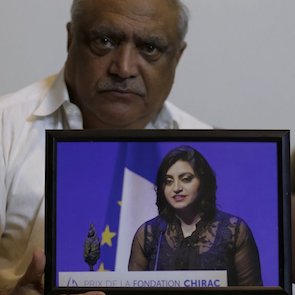Judicial harassment of human rights defender Muhammed Ismail persists amid pandemic
The Pakistan authorities must halt their judicial harassment of human rights defender Muhammed Ismail and his wife Uzlifat Ismail and drop all charges against them, said CIVICUS, FIDH, the World Organisation Against Torture (OMCT) and Front Line Defenders. The human rights defender faces charges under the Anti-Terrorism Act and the Pakistan Electronic Crimes Act and is currently on conditional bail, which Pakistan’s Federal Investigative Agency has sought to revoke. His next hearing to determine bail is scheduled for 18 May 2020 before the Peshawar High Court.
Muhammed Ismail is the Secretary-General of the Pakistan NGO Forum (PNF), an umbrella body of civil society organizations (CSOs) in Pakistan. In July 2019, he and his wife was charged under the Anti-Terrorism Act. The case was brought against him in connection with judicial harassment against his daughter, Gulalai Ismail, for her human rights work. Gulalai Ismail has faced persecution from authorities for her peaceful advocacy for the rights of women and girls, and her efforts to end human rights violations against the ethnic Pashtun people in Pakistan. She was forced to leave the country due to concerns for her safety.
On 24 October 2019, Muhammed Ismail was forcibly abducted from outside the Peshawar High Court by unidentified men. He was later found in the custody of Federal Investigation Agency’s Cyber Crimes Unit. He was charged under the Pakistan Electronic Crimes Act for “hate speech” and “spreading false information against government institutions” and detained for more than a month in conditions that may amount to cruel, inhuman and degrading treatment before his release on conditional bail on 25 November 2019. The charges against him are still pending.
Muhammad Ismail’s wife, Uzlifat Ismail was denied from renewing her passport in November 2019, as her name has been placed on the Exit Control List, barring her from leaving the country.
Our organisations believe there is no basis for the charges against Muhammed Ismail and his wife, which appear to have been levelled by the authorities to silence Muhammad Ismail and his daughter Gulalai. Such judicial harassment highlights the hostile environment for human rights defenders, journalists, and other civil society members in Pakistan to exercise their freedom of expression and criticism of the state.
On 20 April 2020, Muhammed Ismail was summoned to a court hearing after the Federal Investigation Agency filed an appeal to revoke his conditional bail. Neither he nor his lawyer were formally notified of the hearing, and they have not been given a reason why the Court accepted the appeal to revoke the conditional bail. The hearing was postponed until 18 May 2020. His bank account has also been frozen by the authorities.
We condemn the Pakistani authorities’ attempts to revoke his bail and resume his detention on baseless charges. We are particularly alarmed that he could be returned to prison during the COVID-19 pandemic, which leaves prisoners in overcrowded jails at high risk of contracting the virus. Given Muhammed Ismail’s poor health, age, and the conditions of jail, further detention could prove fatal. In March 2020, the UN High Commissioner for Human Rights called for the release of political prisoners, as COVID-19 infection rates rose dramatically worldwide.
The authorities must immediately end the politically motivated persecution against Muhammed Ismail and his family. We also call on the authorities to take immediate steps to ensure that all human rights defenders in Pakistan can carry out their legitimate activities without any hindrance or fear of reprisals, including ending the misuse of draconian laws to target those who speak out.
CIVICUS: World Alliance for Citizen Participation
Front Line Defenders
FIDH, within the framework of the Observatory for the Protection of Human Rights Defenders
World Organisation Against Torture (OMCT), within the framework of the Observatory for the Protection of Human Rights Defenders

